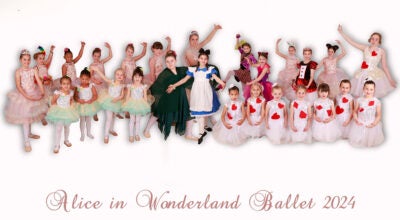More love for the world
Published 3:35 pm Saturday, July 23, 2016
“More love” seems to be the battle cry after all of the travesty that has taken place in the world lately. That is awesome. However, knowing how to display more love, especially on a global scale, is not only difficult but often overwhelming. We have the desire but we don’t have clear answers for where to begin and how to do it. Do we hug random people? Do we buy groceries for someone less fortunate? Do we hold our tongue because we remind ourselves that Jesus died for everyone? The answer is yes, that and anything else that will take us outside of self and into a more giving, sacrificing, unifying, gracious, thankful state of being. But still, that is difficult for many of us because we wonder if it makes a real difference.
I am a Christian and try to look at Biblical principles as applications for my life. In Acts 1:8, it speaks about preaching first in the homeland and then going out to other parts of the world. Now, if you are not of the Christian faith, please don’t stop reading. This is not a conversion piece. However, I think it gives us a great guide for where to start showing love. For me, because I am probably taking a lot of liberties with this verse and because I do have a background in Human Development, my homeland is my family.
What if, instead of, or at least in conjunction with, global neighborly love, we started changing the world by really loving our spouses and children. Not love in words but in deeds. The kind of love that makes us hurt because we sacrifice ourselves for the good of them. What if we stop divorcing? What if we engage in conversations with our children? With our spouses? What if we take a long social media break and go for a long walk with our family? Could that really change the world? I believe it can (and there is Biblical and secular information that backs up that claim).
If you look at research about increased childhood mental illness, increased adolescent delinquency, and just an increase in overall maladaptive adjustments to adulthood, one of the predominant factors in all of those is the status of the family. Children raised in an environment of divorce, single parenthood, and step parenting are found to exhibit more maladaptive and criminal behavior than those raised in a nuclear family (married biological (adoptive) parents).
For real understanding as to why broken or never formed family structures lead to more problematic behavior in children, we need to look deeper at what really happens when the nuclear family fails, is unstable, or was never established.
Poverty increases: Poverty from a developmental perspective is defined as a “lack of”. It is almost a given that a breakup of the family or instability in the family will typically result in some type of lack — money, housing, schooling, activities, food, parental supervision, etc. The child experiencing this situation does not have the benefit of life experience to understand that states of being are not always permanent. Telling them that “things will get better” is a foreign concept to them. Their world was turned upside down, they don’t understand why, and feel like it will never get better. This is an event that will always color the landscape of their development — even if things do “get better.”
Lack of supervision: Children from broken homes or single parents often live in situations where supervision is lacking. If you have a school aged child in your world, you know that readin’, writin’, and ‘rithmatic are only a small portion of what a child learns during the school day. Social development thrives in elementary school but it is not necessarily or only the teacher’s responsibility to teach the child appropriate social responses. Without strong, consistent parental guidance for explanations of appropriate versus inappropriate behavior, there is a lack in their social knowledge. Thus the child may exhibit more antisocial behavior.
Lack of proper nutrition is another major factor when a parent is not present. It can not be overstated the importance of a school-aged child eating a balanced nutritious diet everyday. The physical and cognitive growth during these years demands proper vitamin and mineral support. Without it, your child may be at risk for retardation of cognitive and physical growth. This could result in the child exhibiting behaviors common to mental illness.
Exposure to adult situations and problems: Bad and/or ending relationships almost always result in some type of he said/she said discourse. Even if this discourse is short- lived and civil, the child’s perception will be that it is traumatic and the impact is usually long lasting.
Social media has become the adult playground for airing dirty laundry. It provides an irresistible environment where we can be passive aggressive and know who is truly on our team. We may also feel “safe” using this medium or that our children are protected because they do not have social media accounts. This is a very dangerous assumption. What you put on the internet is permanent. Just because they don’t see it now, doesn’t mean that they won’t see it. Once something is in writing it is very hard to take it back or explain it away. For a child, seeing, in writing, the hurt that parents cause one another, is almost impossible for a child to comprehend and process. The thinking of a school aged child is what is known as “concrete.” This means that if you say it you mean it. This leads to acting out, fighting, withdrawal, inability to form friendships and later romantic relationships, and an increase in depression and anxiety.
Fracture of the definitive foundation of social development: Parents provide the foundation for all aspects of a child’s development. Our first social interactions are with our parents. How they respond to us sets the tone for all other relationships. Our confidence, coping skills, safety, and well being is directly linked to our parents — the family unit. The mother and father’s relationship has a direct impact on the child. A family in turmoil will have children that exhibit tumultuous behavior. It is a sobering fact, but children mirror the behavior of parents. So to be blunt and maybe a little off color, if you act crazy, they act crazy.
If we agree that is our goal is too be a better more loving society, we must look at ourselves, our individual daily behavior, and our closest relationships first. Are we teaching our children about the true meaning of love through our marriages? Our society can not be more loving if we hug a stranger on the street but spew hatred toward our spouses and children. It just doesn’t work. Your marriage matters, your relationship with your children matters. Want to make the world a better place? Start there.
Heather Emory lives in Brookhaven with her husband and three daughters. She holds a master’s degree in psychology and teaches in the Behavioral Science Division at Hinds Community College.





